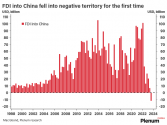Well I can see that I've evidently tapped into quite the well of vitriol here, so in the interests of civility I will refrain from citing him in the future. That being said, I maintain that he is being judged too harshly relative to his actual mistakes. I would agree that he is slaved to his personal model of systemic debt/Hyman Minsky/etc and forces everything he sees through that rather narrow prism, but that sin is quite common in the economics profession regardless if that model happens to be MMT, Neo-Keynesian, or what have you. Everyone believes that they've found the one true explanation for everything. Paul Krugman, Jeffrey Sachs, Robert Solow, and so on are not much different, nor less dogged by their past mistakes, or refusal to acknowledge that the future will not eventually vindicate them and their precious model. Economics is, as they say, a peculiar science. Nonetheless, they remain respected professors teaching at prominent schools, as it were, much like Michael Pettis.
And I would not compare to him political hacks like Gordon Chang or Peter Zeihan. He regularly criticizes American economic policies as well as Argentine, and German, and Japanese, since those economies also diverge sharply from his vision of what correct economics ought to be. It seems like quite a stretch to think he has some kind of political motivation as opposed to the most common one in his profession.
And I would not compare to him political hacks like Gordon Chang or Peter Zeihan. He regularly criticizes American economic policies as well as Argentine, and German, and Japanese, since those economies also diverge sharply from his vision of what correct economics ought to be. It seems like quite a stretch to think he has some kind of political motivation as opposed to the most common one in his profession.
Last edited:


